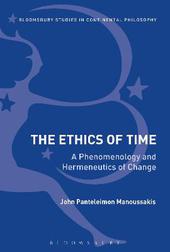
|
The Ethics of Time: A Phenomenology and Hermeneutics of Change
Paperback / softback
Main Details
Description
The Ethics of Time utilizes the resources of phenomenology and hermeneutics to explore this under-charted field of philosophical inquiry. Its rigorous analyses of such phenomena as waiting, memory, and the body are carried out phenomenologically, as it engages in a hermeneutical reading of such classical texts as Augustine's Confessions and Sophocles's Oedipus Rex, among others. The Ethics of Time takes seriously phenomenology's claim of a consciousness both constituting time and being constituted by time. This claim has some important implications for the "ethical" self or, rather, for the ways in which such a self informed by time, might come to understand anew the problems of imperfection and ethical goodness. Even though a strictly philosophical endeavour, this book engages knowledgeably and deftly with subjects across literature, theology and the arts and will be of interest to scholars throughout these disciplines.
Author Biography
John Panteleimon Manoussakis is Associate Professor of Philosophy at College of the Holy Cross, USA, Honorary Fellow of the Faculty of Theology and Philosophy at the Australian Catholic University, Australia, and the recipient of a Templeton Foundation grant.
ReviewsThrough an erudite and wide knowledge of the philosophical and theological traditions and also through his insights, displayed throughout this book, into drama, music and film, Manoussakis has shown how time and ethics can inform the understanding of each other. This is a profound and challenging book in which the temporal constitution of the ethical is shown to be the ethical nature of time. * Notre Dame Philosophical Reviews * This is an engaging, erudite, and frequently beautifully written book by an increasingly formidable voice in the contemporary continental philosophy of religion ... This is a book that deserves to be widely read by anyone working in and around the traditions and themes this book considers ... Manoussakis continues to ascend to the ranks of the very best scholars working in the contemporary continental philosophy of religion. * Reading Religion * There is an active wit in the book that is sharp and playful. * Phenomenological Reviews * John Manoussakis has displayed, in his former books, his specific qualification for bridging the alleged gap between eastern and western theologies. In The Ethics of Time he overcomes the opposition between change and eternity with a strong approach to the eschatological frame of time as a process to redemption. In a notable achievement, the book takes the recent developments in phenomenology and elevates them to serious theology. * Jean-Luc Marion, Professor of Philosophy, Universite Paris (Sorbonne), France and University of Chicago, USA * Elegant, original, erudite, Manoussakis's new book boldly engages the liaison dangereuse between time and the good. In a pioneering study ranging from Anaxagoras to Lacan, from Greek tragedy to contemporary cinema, the author explores the radical implications of the conjoining of ethics and a novel phenomenology of flesh. It is a timely and transformative work. * Richard Kearney, Charles Seelig Professor in Philosophy, Boston College, USA * 'This remarkable book offers a "phenomenological ethics." Although its primary focus is on ethics and time, it ranges widely in a manner that is philosophically engaging and intriguingly structured. The reader is struck by Manoussakis's creative interplay with an impressive cast of interlocutors from theology, philosophy, literature, and film, ranging from Anaxagoras through Augustine to Pirandello and Lars von Trier. An admirable and original work from a genuine thinker. Warmly recommended. * William Desmond, Professor of Philosophy, Institute of Philosophy, KU Leuven, Belgium and David Cook Chair in Philosophy, Villanova University, USA *
|